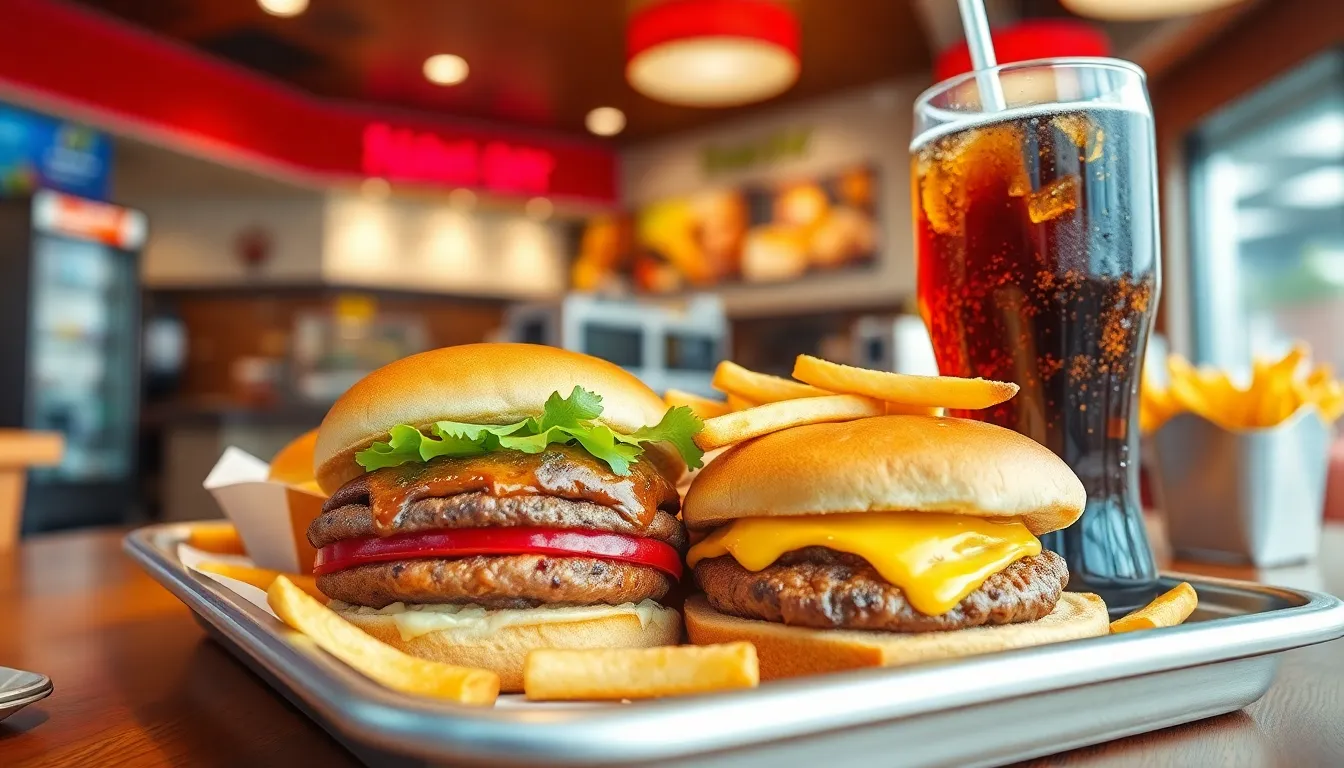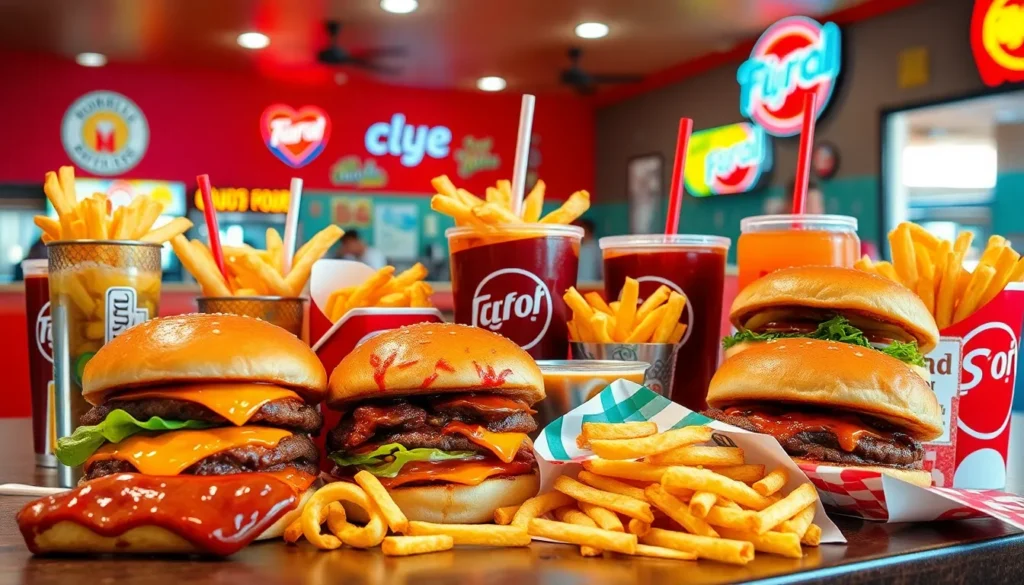Table of Contents
ToggleJunk food has become a staple in modern diets, enticing people with its convenience and irresistible flavors. From crispy chips to sugary sodas, these quick bites offer an instant gratification that’s hard to resist. Yet, beneath the surface of this tasty allure lies a growing concern about its impact on health and well-being.
As lifestyles become busier, more individuals reach for these processed options, often overlooking the long-term consequences. The rise of fast food chains and snack brands has made junk food more accessible than ever, leading to increased consumption rates. Understanding the effects of junk food on health is crucial for making informed dietary choices and promoting better eating habits.
Overview Of Junk Food
Junk food includes a wide array of processed food items high in sugar, unhealthy fats, and sodium. Common examples include chips, candies, sugary beverages, and fast food meals. These items are often marketed as convenient and tasty, catering to those seeking quick snacks or meal solutions.
Most junk foods undergo significant processing, stripping away essential nutrients. Instead, they provide empty calories, which can lead to overeating without satisfying hunger. The enticing flavors and aggressive marketing strategies contribute to a culture where junk food consumption becomes a habitual choice.
Several studies link junk food consumption to various health issues. Obesity, heart disease, diabetes, and gastrointestinal problems frequently arise from regular intake of these food items. High levels of sugar and unhealthy fats contribute significantly to these health risks, impacting overall well-being.
Understanding junk food’s role in the diet remains crucial. As awareness of its effects grows, many individuals explore healthier alternatives. This shift fosters a greater emphasis on whole foods, balanced meals, and mindful eating practices.
Types Of Junk Food

Various types of junk food dominate modern diets, impacting health and lifestyle choices. The main categories include fast food, snack foods, and sugary beverages.
Fast Food
Fast food encompasses quick-service meals often high in calories, fat, sugar, and sodium. Items like burgers, fries, and fried chicken constitute popular choices. Restaurants emphasize speed and convenience, which encourages frequent consumption. Many fast food chains exaggerate portion sizes, leading to larger calorie intakes. According to the CDC, about 37% of adults consume fast food on any given day.
Snack Foods
Snack foods refer to processed items designed for quick consumption, including chips, cookies, and candy. These products often contain excessive sugars, unhealthy fats, and artificial additives. Many individuals snack mindlessly, increasing overall calorie intake without substantial nutritional benefits. A study published in the journal Appetite shows that snacking contributes to about 25% of daily caloric intake, particularly among children and teenagers.
Sugary Beverages
Sugary beverages like soda, energy drinks, and sweetened tea provide significant amounts of sugar with little to no nutritional value. One 12-ounce can of soda contains approximately 39 grams of sugar, exceeding the American Heart Association’s recommended daily limit for added sugars. Regular consumption of these drinks links to weight gain and increases risks for type 2 diabetes and heart disease. The World Health Organization reports that reducing sugary beverage intake can significantly lower obesity-related health issues.
Health Impacts Of Junk Food
Junk food consumption leads to significant health issues affecting both physical and mental well-being. Understanding these impacts helps individuals make better dietary choices.
Physical Health Risks
Junk food is linked to multiple physical health risks, primarily due to its high levels of sugar, unhealthy fats, and sodium. Regular consumption contributes to obesity, with studies showing that individuals who frequently consume junk food gain weight at higher rates compared to those who don’t. The American Heart Association notes that excessive intake of trans fats and saturated fats increases the risk for heart disease.
Moreover, junk food consumption elevates the risk of type 2 diabetes. A study by the Journal of Diabetes Investigation indicates that increased intake of sugary beverages and fast food correlates with a higher likelihood of developing this condition. Other physical health problems include gastrointestinal issues, as highly processed foods often lack fiber necessary for digestive health.
| Health Risk | Association with Junk Food |
|---|---|
| Obesity | Higher weight gain rates |
| Heart Disease | Increased risk from trans and saturated fats |
| Type 2 Diabetes | Linked to sugary beverages and fast food consumption |
| Gastrointestinal Issues | Lacking fiber in processed foods |
Mental Health Effects
Junk food also affects mental health. Diets high in processed foods are associated with an increased risk of depression and anxiety. Research published in the journal Psychiatry Research suggests that consuming fast food elevates the risk of developing depressive symptoms. This correlation may stem from inadequate nutrition, as essential vitamins and minerals support brain function.
Additionally, high sugar intake can lead to mood swings and increased irritability. A study from the University of Colorado Boulder indicates that sugar-rich diets contribute to altered brain function impacting mood regulation. The emphasis on convenience in processed foods further reduces the likelihood of preparing balanced meals, leading to poor overall dietary practices that can harm mental health.
Cultural Influence Of Junk Food
Junk food exerts a significant cultural influence, shaping dietary habits and social norms across various demographics. Marketing strategies and social trends contribute to its prominent role in contemporary society.
Marketing Strategies
Marketing strategies for junk food leverage emotional appeals, convenience, and branding to attract consumers. Advertisements frequently emphasize taste and instant gratification, targeting children and young adults through colorful packaging and catchy slogans. Promotions often include social media campaigns, celebrity endorsements, and interactive experiences to engage younger audiences. These tactics create brand loyalty, as consumers associate junk food with positive emotions, leading to repeated purchases. Nutritional information is often minimized, focusing instead on the appealing aspects of these products. Consequently, consumers may overlook the health implications linked to junk food consumption.
Social Trends
Social trends reflect a growing normalization of junk food as a staple in everyday life. Urban settings often feature fast food outlets and convenience stores, making junk food easily accessible. Peer influence plays a vital role, as individuals frequently share experiences about fast food outings or snack choices on social media platforms. Additionally, food culture has evolved, with junk food being incorporated into social gatherings, celebrations, and events, reinforcing its accepted status. As a result, its consumption becomes intertwined with social interactions, contributing to a cycle of continued popularity despite known health risks.
Junk food’s allure is undeniable in today’s fast-paced world. Its convenience and taste make it a popular choice for many. However, the health risks associated with its consumption are significant and cannot be overlooked. As individuals become more aware of these dangers, there’s a growing shift towards healthier eating habits and mindful choices.
Exploring alternatives that prioritize nutrition can lead to improved physical and mental well-being. By understanding the impact of junk food on health, people can take proactive steps to create a balanced diet that supports a healthier lifestyle. Ultimately, making informed decisions is key to fostering better eating habits and enhancing overall health.




